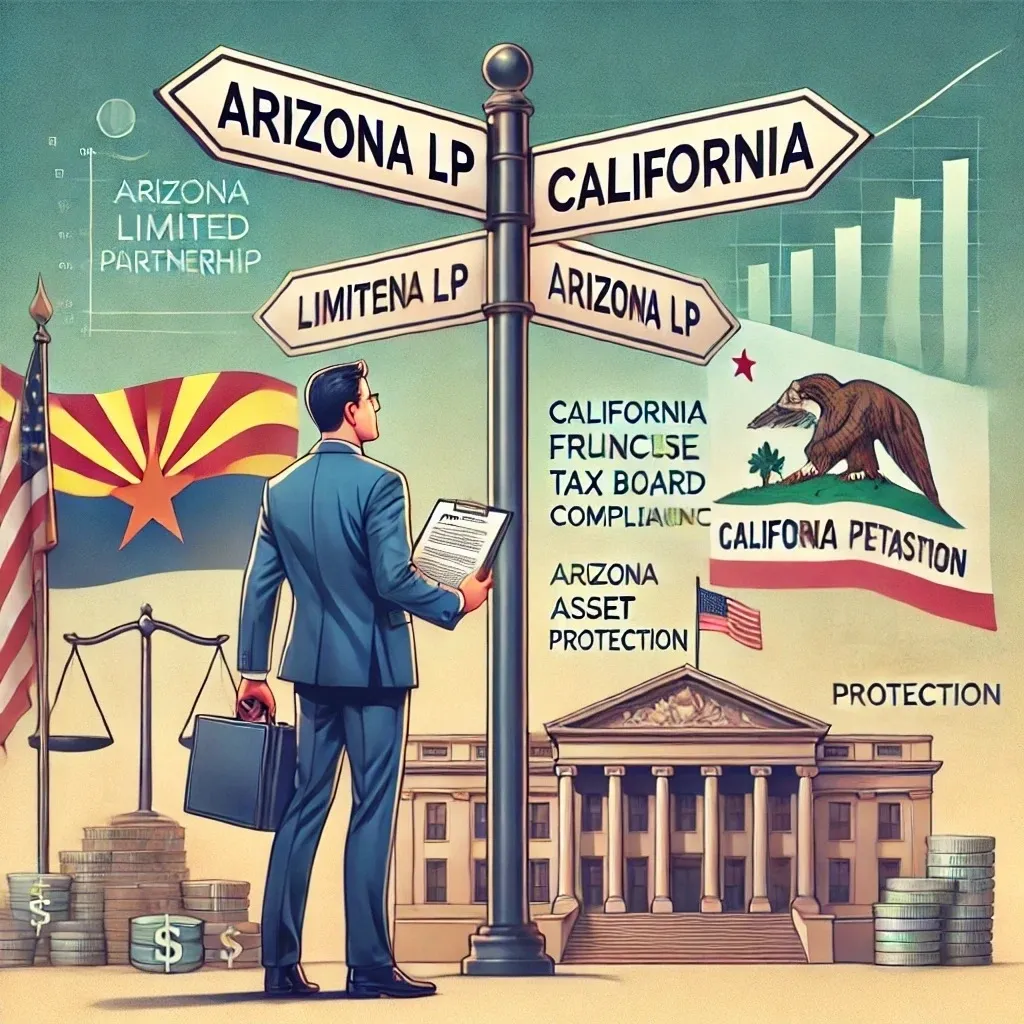For California residents setting up an Arizona Limited Partnership (LP), understanding California tax laws and registration requirements is critical. While Arizona LPs offer strong asset protection and tax advantages, California’s strict tax enforcement means that many Arizona LPs must still register and pay taxes in California if they meet certain criteria.
At Bradley Legal Corp, we help clients navigate California’s complex tax laws to ensure they remain compliant while maximizing their asset protection and financial strategies. Here’s everything you need to know about Arizona LP registration in California and how to protect your assets.
When Does an Arizona Limited Partnership Need to Register in California?
Under California Revenue and Taxation Code § 23101, any entity that is “commercially domiciled” in California is subject to state tax laws and required to file with the Franchise Tax Board (FTB).
An Arizona LP is considered commercially domiciled in California if it meets any of the following:
✔️ Owns property in California (real estate, office space, rental properties)
✔️ Has employees or payroll in California
✔️ Generates income or conducts business transactions in California
If your Arizona LP meets any of these criteria, you are likely required to:
📌 Register the LP with the California Secretary of State
📌 File a tax return with the California Franchise Tax Board
📌 Pay California’s minimum franchise tax ($800 per year)
📌 Comply with additional tax reporting obligations
💡 If your Arizona LP is purely passive—meaning it holds investments but does not actively conduct business in California—you may not need to register. However, this should be confirmed with a CPA or legal professional.
Consequences of Not Registering Your Arizona LP in California
Failing to properly register an Arizona LP in California when required can lead to:
⚠️ Significant penalties and interest imposed by the Franchise Tax Board
⚠️ Back taxes owed if California determines your LP should have been registered in prior years
⚠️ Legal and financial risks, including potential loss of limited liability protections
⚠️ Increased scrutiny from the FTB, which actively enforces compliance and conducts audits
California is one of the most aggressive states when it comes to tax enforcement. If your Arizona LP falls under California’s jurisdiction, the state will find a way to collect its share.
Who Needs to Register an Arizona LP in California?
If you are a California resident using an Arizona Limited Partnership, you may be required to register if:
✔️ Your Arizona LP owns rental property or commercial real estate in California
✔️ You conduct business transactions or provide services in California
✔️ Your Arizona LP generates sales, revenue, or income from California sources
✔️ Your LP has employees or business operations physically in California
🚨 California’s Franchise Tax Board is actively tracking out-of-state entities that generate income within California. If your Arizona LP meets the criteria, failure to register can lead to fines and tax liabilities.
How to Register an Arizona Limited Partnership in California
If your Arizona LP meets the criteria requiring registration, follow these steps to stay compliant:
1. File a Foreign Registration with the California Secretary of State
• Submit Form LP-5 (Application for Registration of Foreign LP)
• Pay the required state filing fees
• Designate a California-based registered agent
2. Register with the California Franchise Tax Board
• File Form 565 (Partnership Return of Income) annually
• Pay the $800 minimum franchise tax
• Comply with any additional California tax requirements
3. Consult a CPA or Asset Protection Attorney
• Evaluate your LP’s tax obligations to avoid surprises
• Ensure proper entity structuring to minimize liability and tax exposure
• Develop a long-term asset protection plan that aligns with California regulations
How to Minimize Tax Exposure While Staying Compliant
Many California residents form Arizona LPs to take advantage of lower tax burdens and stronger asset protection laws. However, if the LP operates in California, it must comply with California tax laws.
To reduce unnecessary tax liabilities:
✔️ Keep Arizona LP activities outside California whenever possible
✔️ Use proper structuring with asset protection trusts or LLCs
✔️ Work with a financial planner or CPA to ensure compliance while minimizing tax exposure
📌 Proactive tax planning can help California residents legally structure their Arizona LP to minimize unnecessary state taxes.
Protecting Your Assets While Remaining Compliant
California’s strict tax enforcement means that proper entity structuring and asset protection planning are essential. If you are a California resident using an Arizona LP, you must ensure your financial plan accounts for potential registration and tax obligations.
At Bradley Financial Planning, we help clients:
✔️ Structure their LPs correctly to reduce California tax exposure
✔️ Ensure compliance with California and Arizona tax laws
✔️ Develop long-term financial strategies for asset protection
💡 With the right planning, California residents can use Arizona LPs while staying compliant and maximizing asset protection.
📩 Need guidance on setting up and maintaining your Arizona LP while staying compliant in California? Contact us today for expert financial planning and tax strategy advice. (888) 773-9399.
By: Brian T. Bradley, Esq.




